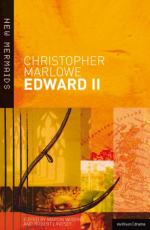|
This section contains 499 words (approx. 2 pages at 400 words per page) |

|
Born in the same year as William Shakespeare, 1564, Christopher Marlowe was the son of an affluent shoemaker in Canterbury. Like Shakespeare, Marlowe eventually migrated to London, where he became a member of an erudite social circle that included Sir Walter Raleigh, Thomas Kyd, and others; these men were regarded as freethinkers, in part because they endorsed the new and controversial "scientific" thinking. Marlowe spent six years as a Cambridge scholar, reveling in subjects such as rhetoric, logic, and philosophy; he was especially drawn to the works of Aristotle, which he approached not from the religious perspective of most of his peers, but from a more philosophical and literary angle. Marlowe probably attended numerous university productions of comedies, satires, and tragedies, many of which dealt with the lives of scholars. His own plays tended toward the philosophic, probing the limits of human knowledge and power and exploring...
|
This section contains 499 words (approx. 2 pages at 400 words per page) |

|




